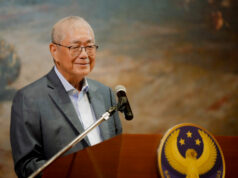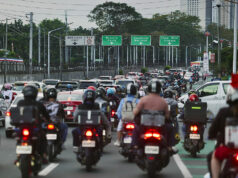By Janina C. Lim
Reporter
THE Philippines enacted an Ease of Doing Business Law this year, during which it also fell 11 places on the World Bank’s Doing Business report to 129th place. The embarrassing result unleashed a torrent of complaints from the government — concurred in by businesses — about the fairness of the study’s methodology.

A particular focus of the government’s wrath was the Philippines’ performance in the report’s Getting Credit metric, which officials called “grossly inaccurate” because it used “severely understated” data.
The Philippine score on that metric on the 2019 survey, released this year, had plunged to 5 points, as against the 30 points it received in the 2018 survey
“They’re not intending to revise it,” said Department of Trade and Industry (DTI) Secretary Ramon M. Lopez in a phone interview.
The DTI, together with the Department of Finance, wrote to the World Bank, saying the Philippines should have obtained a higher score on access to credit had data from all credit bureaus been taken into account.
For the latest study, the World Bank obtained its credit facility data solely from the BAP Credit Bureau, Inc. which happens to have the smallest database at 1.7 million borrower-entrepreneurs. The major credit bureaus with larger coverage were included in the previous year’s survey.
“They should find a way to include those because the reality is that they are present,” added Mr. Lopez, also the concurrent chair of the Anti-Red Tape Advisory Council (ARTAC) which was created to implement the EoDB law.
Mr. Lopez pointed out that the 2019 report “failed to reflect the reality on the ground,” as available credit has recently been growing year-on-year by nearly a fifth, thanks mostly to micro, small and medium enterprises.
Mr. Lopez said the report is widely used by the global investing community, and the country’s ranking can affect their perception of the Philippine business environment.
The good news is that the report does not seem to be deterring new investment. Foreign direct investment (FDI) hit a record $10 billion last year, when the Philippines endured an even worse 14-place decline in the study to 113th from 99th.
According to the central bank, FDI in the eight months to August totaled $7.422 billion, up 31% year-on-year.
At eight months, the total was equivalent to 82% of the Bangko Sentral ng Pilipinas’ $9.2-billion FDI forecast for the entire year.
Despite two consecutive years of declines amounting to 25 places in the rankings, as well as falling out of the top 100, the Philippines continues to struggle to meet President Rodrigo R. Duterte’s mandate of landing within the top 20% of the 190 economies surveyed — or at least 38th.
“We can still target that ranking because all these new laws being passed will hopefully be credited by next year,” Mr. Lopez said.
He cited the Senate-approved bill amending the 38-year-old Batas Pambansa 68 or the Corporation Code of the Philippines; the updating of the implementing rules and regulations (IRR) of the Business Name Act of 1931 or Republic Act 3883; the proposed amendment to the Securities Regulations Code; and the EoDB law which missed being factored into the 2019 Doing Business survey, among others, as having the potential to boost the country’s standing.
Some business groups operating in the Philippines also called out the World Bank report’s methodology.
“I think it is unfair,” said American Chamber of Commerce of the Philippines, Inc. Senior Adviser John D. Forbes in an interview.
He noted that the Philippines undertook major reforms nearly 10 years ago, with a credit information system in which all the banks entered information on their creditors, allowing future lenders to gauge their reliability.
“In the United States we have companies get all this information from credit providers and everybody has a credit rating… We have a similar system now in the Philippines,” Mr. Forbes said in an interview.
“I have not talked to the World Bank so I don’t understand their reasoning but that shocked me and I think that was wrong,” Mr. Forbes added.
Philippine Chamber of Commerce and Industry President Ma. Alegria Sibal-Limjoco also expressed support for the government.
“Business people when we ask them say that conditions have improved. Maybe a few others are concerned with corruption, I don’t know,” she said in an interview.
But to further improve the country’s ranking, business groups said that for a real impact on ease of doing business, the government can start with the ports.
In the “Trading Across Borders” indicator where the Philippines improved slightly to a 69.90 point score from 69.39, Mr. Forbes pointed to the unnecessary nature of some documentary requirements, even after the enactment of the Customs Modernization and Tariff Act of 2016.
“The bureau has gone online. But, let’s say you have air freight coming into NAIA, the paper work is still required. So it’s more work rather than less work,” the AmCham official said.
He also pointed out “some fear of port congestion,” a side effect of increased imports associated with higher government spending.
“It has to be more seamless, more efficient. I don’t think the green lane imports are effective yet. (There are) hold ups for inspection (even though green lane users) are known to be trustworthy,” Mr. Forbes said.
“We have a problem in that case with too many imports because of high level of imports and too few exports,” he added.
In the nine months to September, the trade deficit widened by 70.5% to $29.91 billion.
“A long-term solution is needed to speed up the dispatch of shipments,” Philippine Exporters’ Confederation, Inc. President Sergio R. Ortiz-Luis, Jr. said in an interview.
The Philippine Ports Authority (PPA) has denied the existence of a congestion problem even in the weeks before the holidays.
“As far as we are concerned within our operations, there is no congestion. In fact, utilization has been high,” Jay Daniel R. Santiago, PPA general manager, told BusinessWorld in November.
The Manila port’s utilization currently stands at 70% as against the 90% recorded in 2014 when the country experienced a severe case of port congestion, according to Mr. Santiago.
“The people who think there is a port congestion problem may be considering things that happen outside the ports, particularly road congestion. For that one we’re coordinating with the road and rail sectors in order to find ways to be able to ease up road congestion,” Mr. Santiago added.
He noted that the start of operations at the Cavite Barge Terminal will help in easing congestion.
Inaugurated on Nov. 23, the Cavite terminal is expected to decongest the roadways leading to and from the port of Manila by at least 140 trucks a day.
The terminal is also expected to further ease utilization at the Manila port as the PPA can more quickly dispatch container vans.
“Were also planning to do a similar facility north of Manila. The initial location is Orion, Bataan. What will happen is that the movement of boxes will be done over the water rather than on the road,” he added.
Business groups are also clamoring to implement a more immediate solution: applying the shorter timeline to process business documents as prescribed by the EoDB law.
“We passed the ease of doing business law, almost six months ago, but it has not yet been implemented,” Mr. Ortiz-Luis said.
“Very ironic that it has not yet been implemented,” he added.
Republic Act No. 11032 or the Ease of Doing Business law, signed in May, requires processing times of three, seven and 20 days for simple, complex, and highly-technical transactions with the government.
Government officials failing to process applications on time will incur suspensions of 30 days without pay for a first offense and a three-month suspension without pay for a second offense.
A third offense comes with the penalty of dismissal and disqualification from holding public office; forfeiture of civil service eligibility and retirement benefits; and one to six years’ imprisonment.
Although the DTI as the temporary secretariat of the ARTAC succeeded in completing the law’s IRR on time, the formation of the ARTAC is crucial as it has the sole authority to formally issue the IRR and make effective the 3-7-20 processing timeline.
Mr. Lopez expects the appointments, particularly for the ARTAC’s director general and two deputy directors-general, to be issued before the year ends.
Asked if these developments will help bring the Philippines back into the top 100 for the 2020 Doing Business survey, Mr. Lopez replied in the positive.



